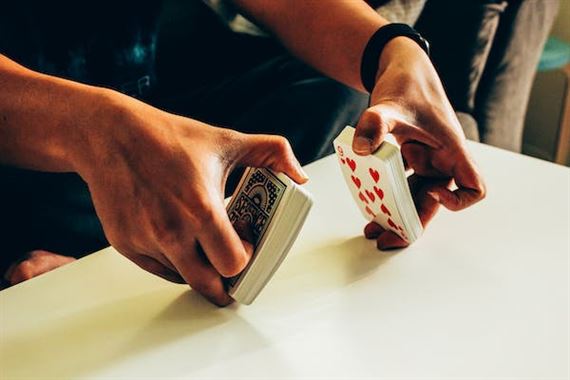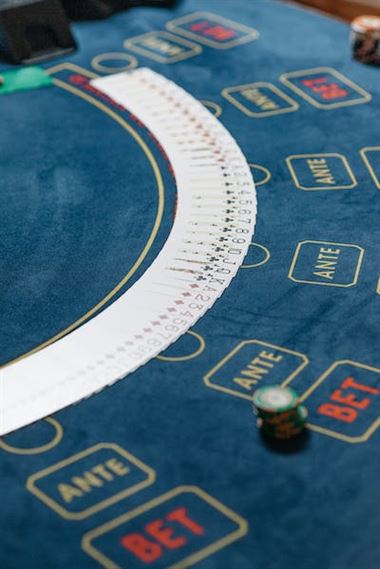The Poker Player’s Code: Mastering Etiquette for the Table is a guidebook that focuses on teaching poker players the importance of adhering to proper etiquette while playing the game. This book aims to provide players with a comprehensive understanding of the unwritten rules and expectations that govern behavior at the poker table. By following these guidelines, players can create a more enjoyable and respectful environment for everyone involved in the game.
Proper Conduct at the Poker Table: Essential Etiquette Tips
Poker is not just a game of cards; it’s a game of skill, strategy, and psychology. And like any other game, there are rules and codes of conduct that players must adhere to. Proper etiquette at the poker table is essential for creating a respectful and enjoyable environment for all players involved.
First and foremost, when you sit down at a poker table, it is important to be punctual. Arriving late disrupts the flow of the game and can create unnecessary tension among players. Being on time shows respect for your fellow players and demonstrates your commitment to the game.
Once seated, it is crucial to handle your chips with care. Avoid splashing the pot by tossing your chips into the center. Instead, place them neatly in front of you, allowing everyone at the table to see and count your stack. This ensures transparency and prevents any misunderstandings or disputes regarding chip counts.
Another vital aspect of proper poker etiquette is maintaining a calm and composed demeanor. Losing a hand or experiencing a bad beat can be frustrating, but it is essential to control your emotions. Outbursts of anger or frustration not only disrupt the atmosphere but also give away valuable information about your hand to observant opponents. Keep a straight face and remain stoic throughout the game, regardless of the outcome of each hand.
Furthermore, respecting the dealer is an integral part of poker etiquette. Dealers play a crucial role in facilitating the game and ensuring fair play. Always address the dealer politely and refrain from criticizing their actions or decisions. If you have any concerns or questions, raise them respectfully and allow the dealer to explain their reasoning without interruption.
In addition to treating the dealer with respect, it is equally important to show courtesy towards your fellow players. Engaging in friendly conversation is encouraged, as it helps create a social and enjoyable atmosphere. However, avoid discussing ongoing hands or sharing strategic insights during gameplay. Such discussions may give unfair advantages to certain players and disrupt the integrity of the game.
Moreover, avoid any form of collusion or soft-playing. Collusion refers to secretly working with another player to gain an unfair advantage over others at the table. Soft-playing involves intentionally playing weakly against a friend or acquaintance to ensure their success. Both practices are considered unethical and can result in severe consequences, including being banned from poker establishments.
Lastly, remember to handle your cards and chips discreetly. Keep your hole cards hidden from view by using a chip or card protector. This prevents accidental exposure and maintains fairness in the game. Similarly, avoid unnecessarily splashing the pot with chips when placing bets, as this may lead to confusion and disputes among players.
Mastering proper etiquette at the poker table is not only about following rules; it is about creating an environment where everyone feels comfortable and respected. By adhering to these essential guidelines, you contribute to a positive and enjoyable poker experience for yourself and your fellow players. So next time you sit down at the poker table, remember the importance of the poker player’s code and strive to be a true master of poker etiquette.
How to Respectfully Handle Wins and Losses in Poker
Poker is not just a game of skill and strategy; it is also a social activity that requires players to adhere to a certain code of conduct. One crucial aspect of this code is how to respectfully handle wins and losses at the poker table. Mastering this etiquette is essential for maintaining a positive atmosphere and ensuring a fair and enjoyable game for all.
Firstly, when it comes to winning, it is important to remember that gloating or showing off is considered highly disrespectful. While it is natural to feel a sense of accomplishment after a successful hand, rubbing it in your opponents’ faces will only create animosity and spoil the camaraderie of the game. Instead, graciously accept your victory with humility and avoid any excessive displays of celebration.
Furthermore, avoid making derogatory comments or belittling your opponents when you win a hand. Remember, everyone is playing the game to the best of their abilities, and criticizing others for their mistakes or misplays is not only impolite but also goes against the spirit of friendly competition. Treat every player with respect and acknowledge their efforts, regardless of the outcome.
On the other hand, handling losses gracefully is equally important. No one likes losing, but it is an inevitable part of poker. It is crucial to maintain composure and avoid becoming frustrated or angry when luck does not go your way. Venting your frustrations by blaming others or engaging in outbursts can create tension and ruin the atmosphere at the table.
Instead, take losses as learning opportunities and use them to improve your own skills. Reflect on your gameplay and consider what you could have done differently. By focusing on self-improvement rather than dwelling on defeat, you not only show respect for the game but also set a positive example for others.
In addition, be mindful of your behavior towards other players who have suffered losses. Offering condolences or expressing sympathy can be seen as condescending or patronizing. While it is important to be empathetic and understanding, avoid rubbing salt in their wounds by excessively discussing the hand or highlighting their mistakes. Instead, offer a friendly smile or a nod of acknowledgment to show your support without patronizing them.
Another crucial aspect of handling wins and losses respectfully is managing your bankroll responsibly. It is easy to get caught up in the excitement of winning streaks or chase losses with higher bets. However, responsible poker players know that maintaining financial stability is essential for long-term success and enjoyment of the game. Avoid reckless behavior such as borrowing money or risking more than you can afford to lose.
In conclusion, mastering the etiquette of how to handle wins and losses at the poker table is an integral part of being a respectful player. Whether you win or lose, it is crucial to display humility, respect, and composure. Avoid gloating over victories or criticizing opponents, and likewise, refrain from becoming frustrated or angry when luck is not on your side. By adhering to these principles, you contribute to a positive atmosphere and ensure that everyone enjoys the game to its fullest potential.
Understanding Table Talk: Dos and Don’ts of Conversation
When it comes to poker, the game itself is not solely about the cards. It’s also about the players and the interactions that take place at the table. Understanding proper table talk etiquette is crucial for any serious poker player. The way you communicate with your opponents can have a significant impact on the dynamics of the game and ultimately affect your chances of winning.
One fundamental rule of thumb when it comes to table talk is to always be respectful. Poker is a competitive game, but that doesn’t mean you should disrespect or insult your opponents. Keep in mind that everyone is there to enjoy the game and have a good time. Engage in friendly banter, but avoid crossing the line into offensive or derogatory remarks. Remember, it’s just a game, and maintaining a positive atmosphere will make it more enjoyable for everyone involved.
Another important aspect of table talk etiquette is knowing when to speak and when to stay silent. In general, it’s best to keep conversation to a minimum during hands. Talking excessively can distract other players and disrupt their focus. However, during breaks between hands or when you’re not directly involved in the action, engaging in light conversation can help build rapport with your opponents.
It’s crucial to be mindful of the information you reveal through your words and body language. Avoid discussing specific hands or strategies openly, as this can give away valuable insights to your opponents. Even seemingly innocent comments like “I had such a great hand” can unintentionally provide others with information they can use against you. Similarly, be aware of your non-verbal cues. Avoid showing disappointment or excitement when you see your cards, as this can give away clues about the strength of your hand.
While it’s essential to be cautious about what you say at the table, it’s equally important to pay attention to what others are saying. Listening carefully to your opponents’ conversations can provide valuable information about their playing style and mindset. If an opponent is discussing a previous hand, for example, you might gain insights into their strategy or tendencies. Use this information to your advantage and adjust your own gameplay accordingly.
Lastly, it’s crucial to remember that table talk etiquette extends beyond the game itself. After a hand, congratulate opponents on their wins and be gracious in defeat. This shows respect for the skill and effort they put into the game. Additionally, avoid discussing hands or criticizing other players’ decisions once the game has ended. Dwelling on past hands can create tension and sour the overall atmosphere.
In conclusion, mastering table talk etiquette is an essential part of becoming a skilled poker player. By being respectful, knowing when to speak and when to stay silent, guarding the information you reveal, listening carefully to others, and maintaining good sportsmanship, you can enhance your playing experience and build positive relationships with your opponents. Remember, poker is not just about the cards; it’s also about the interactions at the table. So, next time you sit down to play, keep these dos and don’ts of conversation in mind and enjoy the game to its fullest.
The Art of Sportsmanship in Poker: Navigating Competitive Situations
Poker is not just a game of skill and strategy; it’s also a game that demands a high level of sportsmanship and etiquette. Mastering the art of sportsmanship in poker is crucial for navigating competitive situations with grace and respect.
In the world of poker, competition can be fierce. Players are pitted against each other, vying for the same pot of money. Tensions run high, emotions flare, and the temptation to engage in unsportsmanlike behavior can be strong. However, true masters of the game understand that maintaining a sense of decorum at the table is essential.
One key aspect of sportsmanship in poker is treating opponents with respect. Regardless of whether you’re playing against seasoned professionals or inexperienced amateurs, it’s important to remember that everyone deserves to be treated fairly and courteously. This means refraining from insults, derogatory remarks, or any form of personal attacks. Instead, focus on the game itself and strive to create an environment where all players feel comfortable and respected.
Another crucial element of sportsmanship is controlling one’s emotions. Poker can be an emotional rollercoaster, with swings of luck causing frustration, anger, or disappointment. However, allowing these emotions to dictate your behavior at the table is not only detrimental to your own performance but also disrespectful to your opponents. A true master of sportsmanship knows how to maintain composure, even in the face of adversity. Take deep breaths, count to ten if necessary, and remember that losing your cool will only lead to poor decision-making and regret.
Furthermore, good sportsmanship means accepting defeat graciously. Losing is an inevitable part of poker, and how you handle defeat says a lot about your character as a player. Instead of blaming bad luck or berating yourself for mistakes, take the opportunity to learn from your experience. Congratulate the winner genuinely and acknowledge their skill. By doing so, you not only show respect for your opponents but also demonstrate maturity and a willingness to grow as a player.
On the flip side, winning with grace is equally important. It’s easy to get caught up in the excitement of a big win, but gloating or rubbing it in your opponents’ faces is a sure way to sour the atmosphere at the table. Instead, be humble and modest in victory. Remember that luck plays a significant role in poker, and tomorrow might bring a different outcome. Treat your fellow players with kindness and respect, regardless of whether you’re on the winning or losing side.
Lastly, part of mastering sportsmanship in poker is being mindful of your actions and their impact on the game. Avoid excessive talking, especially during critical moments when concentration is key. Respect your opponents’ need for focus by refraining from distracting behavior such as tapping the table or shuffling chips unnecessarily. Additionally, always act in turn and avoid slow playing or stalling tactics that can disrupt the flow of the game and frustrate other players.
In conclusion, mastering the art of sportsmanship in poker is essential for navigating competitive situations effectively. Treating opponents with respect, controlling emotions, accepting defeat graciously, and winning with humility are all crucial aspects of good sportsmanship. By adhering to these principles, not only will you enhance your own experience at the poker table, but you’ll also contribute to creating a positive and enjoyable environment for all players involved.In conclusion, “The Poker Player’s Code: Mastering Etiquette for the Table” is a valuable resource that provides insights and guidelines for maintaining proper etiquette while playing poker. It emphasizes the importance of respect, fairness, and sportsmanship among players, aiming to create a pleasant and enjoyable gaming environment. By following the principles outlined in this book, poker players can enhance their overall experience at the table and contribute to a positive atmosphere for everyone involved.





